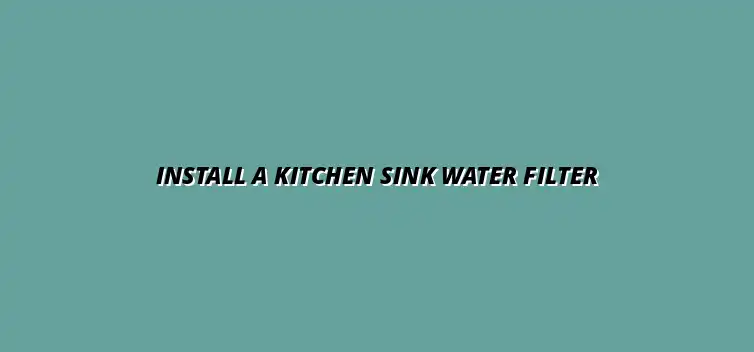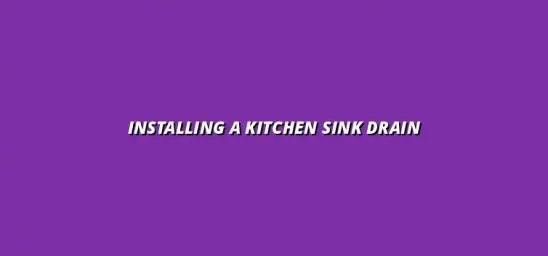
Install a Kitchen Sink Water Filter
Understanding the Importance of Water Filtration Under the Kitchen Sink
Water is an essential part of our daily lives, and ensuring its quality is crucial for our health and well-being. Installing a water filtration system under the kitchen sink not only provides easy access to cleaner water but also significantly improves the taste. With concerns about contaminants in tap water, understanding the importance of filtration is more relevant than ever!
Many homeowners are unaware of the *various benefits* that come with using an under-sink water filter. Beyond just aesthetics, these systems can enhance your overall health by providing fresher and safer drinking water. Let's dive into the specific advantages that installing a water filter can bring to your home. If you're struggling with a clogged kitchen sink, addressing that first might improve your water quality.
Benefits of Installing a Water Filter Under the Sink
Improving Water Quality and Taste
One of the primary reasons to consider an under-sink water filter is the **improvement in water quality**. These filters remove impurities such as chlorine, dirt, and sediment, resulting in water that tastes better and is safer to drink. Many people notice a remarkable difference in the flavor of their water after installation, making it more enjoyable to stay hydrated!
Additionally, many filtration systems target specific contaminants, which means you can customize your setup based on your water source. Some filters can even remove heavy metals, bacteria, and other harmful substances, giving you peace of mind with every glass. In short, the difference in water quality can transform your kitchen experience. For more tips on maintaining a healthy kitchen plumbing system, check out these plumbing maintenance tips for homeowners.
Health Advantages of Filtered Water
Filtered water represents a healthier choice for you and your family. By removing contaminants, these systems help reduce the risk of health issues associated with drinking unfiltered water. This is especially important for vulnerable populations, such as children and the elderly, who may be more sensitive to toxins.
Moreover, drinking filtered water can also promote overall *wellness* by encouraging people to drink more fluids. When water tastes good, you’re likely to drink more of it! This simple change can lead to improved hydration, better digestion, and even clearer skin. Learning how to install a bathroom water filter can further improve your family's access to clean water.
Different Types of Under-Sink Water Filtration Systems
When considering an under-sink water filter, it’s important to understand the different types available. Each of these systems has unique features and benefits, so knowing your options helps you make an informed choice. Here’s a breakdown of some popular filtration technologies.
Reverse Osmosis Systems Explained
Reverse osmosis (RO) systems are widely regarded for their ability to remove a broad range of contaminants. They work by pushing water through a semi-permeable membrane that catches impurities. This method is particularly effective for eliminating heavy metals, salts, and other undesirables.
While RO systems can be a bit more expensive, they offer high-quality filtration and can greatly improve the safety of your drinking water. They also typically include additional filters to enhance taste and remove even more contaminants. Regular maintenance, including cleaning and filter replacement, is crucial for optimal performance; you can find tips on cleaning and replacing water heater filters which can be helpful in understanding the general process.
Carbon Filters and Their Effectiveness
Carbon filters are another popular choice for under-sink filtration. These systems use activated carbon to absorb impurities, making them effective at removing chlorine, sediment, and volatile organic compounds (VOCs). They are often more affordable and easier to install than RO systems.
While they excel in improving taste and odor, it's important to note that carbon filters may not remove all contaminants, such as heavy metals. However, for many households, they provide an excellent balance of performance and cost-effectiveness. Preventing blockages is key to maintaining efficient water flow. Learn how to prevent kitchen sink blockages easily.
Other Filtration Technologies
There are various other filtration technologies available for homeowners looking to improve their water quality. Some options include:
- Ultraviolet (UV) filters: Use UV light to kill bacteria and viruses.
- Ion exchange filters: Remove hard minerals like calcium and magnesium.
- Multi-stage filters: Combine different filtration methods for comprehensive purification.
Understanding these options allows you to select the right system that fits your specific needs and preferences. Regardless of the type you choose, investing in a water filter under your sink is a step towards better health and hydration! For more comprehensive drainage solutions, consider exploring installing a surface drainage system which are a related aspect of home plumbing.
Maintaining Your Under-Sink Water Filter for Optimal Performance
Once you've installed your under-sink water filter, it's essential to keep it in good shape. Regular maintenance is the key to ensuring your water filter works efficiently and provides you with clean, tasty water. By following a simple maintenance routine, you can significantly extend the life of your filtration system and make the most out of your investment!
To maintain your water filter effectively, you'll want to focus on two main areas: changing filter cartridges and keeping the system clean. Doing these tasks regularly will help you enjoy fresh, purified water without any hiccups. Let’s dive deeper into these practices!
Regular Maintenance Practices for Longevity
One of the most critical aspects of maintaining your under-sink water filter is knowing how often to change the filter cartridges. Typically, the lifespan of a filter cartridge can vary based on usage, but most need to be replaced every six months to a year. Here are some general guidelines:
- **Carbon filters**: Replace every 6 to 12 months.
- **Reverse osmosis membranes**: Change every 2 to 3 years.
- **Sediment filters**: Replace every 6 months.
In addition to changing cartridges, keeping your filtration system clean is crucial. Wipe down the exterior of your unit regularly and check for any sediment buildup. Regular cleaning ensures that your system operates smoothly, maximizing filtration efficiency!
Cleaning Tips for Your Water Filtration System
Cleaning your water filter system doesn’t have to be complicated. Here are some straightforward tips to keep your system in top condition:
- **Use a damp cloth** to wipe down the filter housing regularly.
- **Inspect hoses and connections** for leaks or wear and tear.
- **Flush the system** according to the manufacturer’s instructions after filter changes.
These simple practices can help prevent clogs and ensure your water tastes fresh and clean all the time! If you need help with more complex plumbing issues, consider contacting a local professional, such as a plumber in Billesley, Birmingham (or your local equivalent).
Identifying Signs That Your Water Filter Needs Attention
It’s essential to be alert to any signs that your under-sink water filter might need some TLC. Being proactive can save you from bigger issues down the line. Here are common indicators that your filter may require attention:
- **Change in water taste or odor**: If your water starts to taste or smell strange, it's a sign your filter might be clogged.
- **Reduced water flow**: A noticeable drop in water pressure can indicate that it's time to change your filter.
- **Visible sediment in the water**: If you see particles or cloudiness, your filter might not be working effectively.
By watching for these signs, you can ensure that your filter continues to provide you with high-quality water.
When to Seek Professional Help
Sometimes, you might encounter issues that are beyond simple maintenance. If you notice persistent problems with your water quality or if your system is leaking, it may be time to call in a professional. Here are some scenarios where seeking help is advisable:
- **Persistent leaks** that you can't fix yourself.
- **Frequent filter replacements** that don’t improve water quality.
- **Unusual noises** from your filtration system.
Getting professional assistance can ensure that your under-sink water filter remains in perfect working condition, giving you peace of mind!
Addressing Common Questions and Concerns About Under-Sink Water Filters
Many homeowners have questions when it comes to installing and using under-sink water filters. It’s always good to clarify any concerns you might have to make sure you’re getting the most out of your system! Knowing the answers to these FAQs can help ease your mind and guide your water filtration journey.
Let’s explore some frequently asked questions and common issues that might arise during the installation and use of your system.
FAQs About Installation and Use of Under-Sink Water Filters
It's common to wonder if professional installation is necessary for your under-sink water filter. While some people choose to install their systems themselves, hiring a professional can eliminate errors and save time. If you feel unsure about your plumbing skills, it might be worth it!
Another frequent question is related to troubleshooting when the filter isn’t working as expected. First, check all connections and ensure everything is secure. If problems persist, you may need to replace the filter or consult the manufacturer’s manual for specific troubleshooting tips.
Is Professional Installation Necessary?
Professional installation is not always required; however, it can be helpful for those unfamiliar with plumbing systems. Here are some benefits of hiring a pro:
- **Expertise in plumbing**: They know how to connect the filter to your water supply correctly.
- **Time-saving**: Professionals can typically install the system faster than a DIY attempt.
- **Avoiding mistakes**: They can prevent issues that might arise from improper installation.
What to Do If the Filter Is Not Working Properly?
If your under-sink water filter is not functioning as it should, follow these steps:
- **Check for clogs**: Examine the filters and hoses for blockages.
- **Inspect connections**: Ensure all fittings are tight and secure.
- **Replace filters**: If they’re past due for a change, replace them!
If you’ve tried these things and still have problems, it might be time to call a professional for help.
Cost Considerations for Under-Sink Water Filtration Systems
When thinking about installing an under-sink water filter, it’s also essential to understand the costs involved. Initially, you might feel a pinch in your wallet, but many people find that the long-term savings and health benefits outweigh these costs!
In this section, we’ll look at initial investments versus long-term benefits, as well as compare the costs of different filtration options available to homeowners.
Initial Investment vs. Long-Term Savings
While the upfront cost of a good water filtration system might seem high, consider the following:
- **Savings on bottled water**: You’ll likely buy less bottled water after installing a filter.
- **Longer lifespan of appliances**: Clean water can help extend the life of your appliances.
- **Health benefits**: Investing in your health can save money on medical bills!
When you weigh these factors, the initial investment often becomes a smart choice for your home.
Comparing Costs of Different Filtration Options
There are various filtration options available, each with its unique price point. Here's a quick comparison:
- **Carbon filters**: Generally more affordable, usually range from $40 to $150.
- **Reverse osmosis systems**: Typically cost between $150 to $600.
- **Ultraviolet (UV) systems**: Prices can range from $100 to $500.
Choosing the right system for your needs and budget is crucial, so consider both the initial investment and ongoing maintenance costs to find the best fit!
Final Thoughts on Choosing and Installing Your Under-Sink Water Filter
To wrap it all up, maintaining your under-sink water filter is essential for enjoying clean and safe drinking water. Remember the importance of regular filter changes and cleaning practices! Not only does this ensure good water quality, but it also helps your filtration system last longer.
Taking action for better water quality is vital for you and your family’s health. You’ll feel the positive effects of drinking clean water every day!
Recap of Key Points to Remember
As we conclude, here are some key points to remember:
- **Clean water is vital for health**: Drinking filtered water can improve your overall well-being.
- **Maintenance is crucial**: Regular care extends the life of your filtration system.
Investing in water filtration is a step toward ensuring a healthier lifestyle for you and your loved ones!
Importance of Clean Water for Health
Clean water is essential for hydration, cooking, and overall health. Filtered water helps to remove impurities and ensures that you are drinking the best quality water possible!
Understanding Maintenance for Longevity of Your Filter
By understanding how to maintain your filter, you can maximize its performance and enjoy fresh, clean water for years to come. Don’t forget to stay on top of your maintenance tasks!
Encouragement to Take Action for Better Water Quality
Now is the time to take action! Installing an under-sink water filter is one of the best decisions you can make for your household.
Improved water quality can positively impact your lifestyle in many ways. You’ll not only enjoy better-tasting drinking water but also feel good knowing you’re taking care of your health!
How Improved Water Quality Can Impact Your Lifestyle
When you have access to clean water, you might notice better taste when cooking, increased hydration, and a general sense of well-being. It’s a win-win situation!
Next Steps for Interested Homeowners
For those interested in enhancing their home’s water quality, start by researching the best filtration systems for your needs. Whether you choose to install it yourself or seek professional help, taking this step can lead to a healthier lifestyle!





Fixing a Backed-Up Kitchen Sink
Prepare Your Plumbing for Weather
Installing a Kitchen Sink Drain
When to Replace Plumbing Fixtures
Fixing a Jammed Garbage Disposal